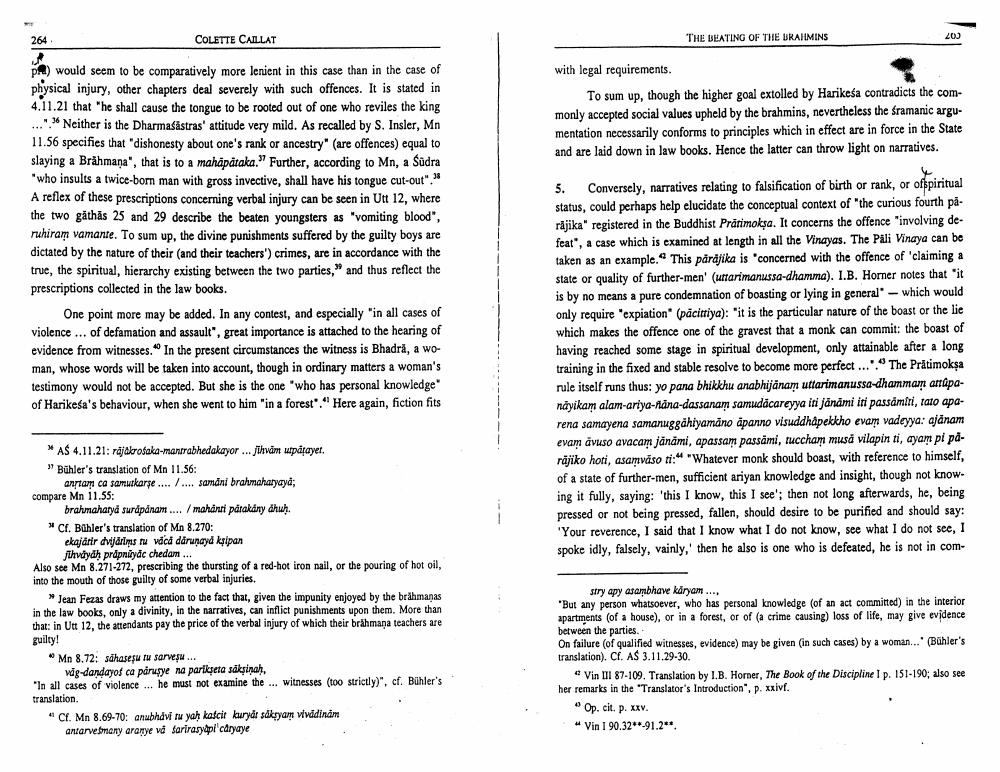________________
264
COLETTE CAILLAT
THE BEATING OF THE URAHMINS
with legal requirements.
To sum up, though the higher goal extolled by Harikesa contradicts the commonly accepted social values upheld by the brahmins, nevertheless the framanic argumentation necessarily conforms to principles which in effect are in force in the State and are laid down in law books. Hence the latter can throw light on narratives.
PA) would seem to be comparatively more lenient in this case than in the case of physical injury, other chapters deal severely with such offences. It is stated in 4.11.21 that "he shall cause the tongue to be rooted out of one who reviles the king ...". Neither is the Dharmasastras' attitude very mild. As recalled by S. Insler, Mn 11.56 specifies that "dishonesty about one's rank or ancestry" (are offences) equal to slaying a Brahmana", that is to a mahäpätaka. Further, according to Mn, a Sudra "who insults a twice-born man with gross invective, shall have his tongue cut-out". A reflex of these prescriptions concerning verbal injury can be seen in Utt 12, where the two gåthas 25 and 29 describe the beaten youngsters as "vomiting blood, ruhiram vamante. To sum up, the divine punishments suffered by the guilty boys are dictated by the nature of their (and their teachers') crimes, are in accordance with the true, the spiritual, hierarchy existing between the two parties, and thus reflect the prescriptions collected in the law books.
One point more may be added. In any contest, and especially in all cases of violence ... of defamation and assault", great importance is attached to the hearing of evidence from witnesses. In the present circumstances the witness is Bhadra, a woman, whose words will be taken into account, though in ordinary matters a woman's testimony would not be accepted. But she is the one who has personal knowledge of Harikesa's behaviour, when she went to him "in a forest"." Here again, fiction fits
5. Conversely, narratives relating to falsification of birth or rank, or offpiritual status, could perhaps help elucidate the conceptual context of "the curious fourth parājika" registered in the Buddhist Prātimokşa. It concerns the offence "involving defeat", a case which is examined at length in all the Vinayas. The Pali Vinaya can be taken as an example. This päräjika is 'concerned with the offence of 'claiming a state or quality of further-men' (uttarimanussa-dhamma). 1.B. Horner notes that it is by no means a pure condemnation of boasting or lying in general' - which would only require "expiation (pacittiya): 'it is the particular nature of the boast or the lie which makes the offence one of the gravest that a monk can commit: the boast of having reached some stage in spiritual development, only attainable after a long training in the fixed and stable resolve to become more perfect ....The Pratimokşa rule itself runs thus: yo pana bhikkhu anabhijanam uttarimanussa-dhammam artapanayikam alam-ariya-rana-dassanam samudăcareyya ini jänami iti passamiri, tato aparena samayena samanuggahiyamāno apanno visuddhåpekkho evam vadeyya: ajanam evam dvuso avacam janami, apassam passami, tucchami muså vilapinti, ayam pl pdräjiko hoti, asamvaso ti:" "Whatever monk should boast, with reference to himself, of a state of further-men, sufficient ariyan knowledge and insight, though not knowing it fully, saying: 'this I know, this I see'; then not long afterwards, he, being pressed or not being pressed, fallen, should desire to be purified and should say: 'Your reverence, I said that I know what I do not know, see what I do not see, I spoke idly, falsely, vainly, then he also is one who is defeated, he is not in com
* A$ 4.11.21: rājdloosaka-mantrabhedakayor ... jīhvām utpåtayet. "Bühler's translation of Mn 11.56:
anstam ca samutkarse..../.... Samāni brahmahatyaya; compare Mn 11.55:
brahmaharya surápánam .... / mahanti påtakány áhuh. * CF. Bühler's translation of Mn 8.270:
ekajärir dvijärims tw vaca därunayd kşipan
Jihvayah prāpnīyāc chedam... Also see Mn 8.271-272, prescribing the thursting of a red-hot iron nail, or the pouring of hot oil, into the mouth of those guilty of some verbal injuries.
»Jean Fezas draws my attention to the fact that, given the impunity enjoyed by the brahmanas in the law books, only a divinity, in the narratives, can inflict punishments upon them. More than that: in Utt 12, the attendants pay the price of the verbal injury of which their brahmana teachers are guilty! * Mn 8.72: sähaseçu tu sarveșu ...
wag-dandayos ca părusye na pariketa saksinah, 'In all cases of violence ... he must not examine the ... witnesses (too strictly)". cf. Bühler's translation "Cf. Mn 8.69-70: anubhavi tu yah kafcit kuryar sdksyam Wwädinám
antarve many aranye và Sarlrasyapi caryaye
stry apy asambhave karyam.. "But any person whatsoever, who has personal knowledge (of an act committed) in the interior apartments (of a house), or in a forest, or of a crime causing) loss of life, may give evidence between the parties. On failure (of qualified witnesses, evidence) may be given in such cases) by a woman...' (Bühler's translation). Cl. AS 3.11.29-30.
Vin III 87-109. Translation by 1.B. Horner, The Book of the Discipline I p. 151-190; also see her remarks in the "Translator's Introduction", p. xxivf.
Op. cit. p. xxv. Vin 1 90.32**-91.2**




